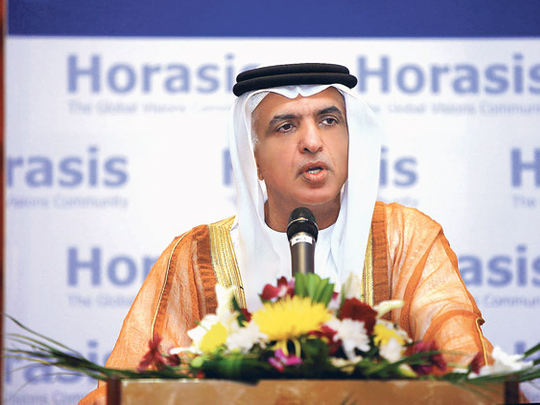
Ras Al Khaimah: Shaikh Saud Bin Saqr Al Qasimi, Crown Prince and Deputy Ruler of Ras Al Khaimah, on Monday said the economic outlook for the Arab region for the next three years has turned "very optimistic".
He pointed out that countries are now focusing on how to achieve enduring economic growth.
Speaking at the opening plenary session of the Global Arab Business Meeting held at the Al Hamra Convention Centre here, Shaikh Saud said, "As far as the Arab region is concerned, I am very optimistic about the coming three years. In the post-financial crisis world order, Asia has become much more relevant to the world economy.
"The inter-trade within Asia has become an engine for growth more than ever before and Asian countries now clock higher growth rates than European countries and the USA. The fundamentals of doing business in our region, which is next to or part of Asia and strategically located next to Europe, are strong."
He said: "The global demand for oil and gas, the maturity of the Gulf states, the massive government investments in education and infrastructure and the young population of countries are factors that augur well for the Arab region in the long term."
Enduring growth
Shaikh Saud added that the UAE is on the path to achieving enduring growth.
"During the crisis, people expected shrinkage in the country's population, which has not happened. Tourism figures are picking up and there is an increase in port and airport activity."
Shaikh Saud said that it is the duty of the governments to balance their budgets and to be transparent so that investors coming to the country can take informed decisions.
Esko Aho, former prime minister of Finland and Executive Vice-President of Nokia, said that European countries should make efforts to reduce public spending and budget deficits which are posing huge long-term risks for European countries and other countries such as the US.
"In western countries the need to improve public spending is greater than their ability to raise taxes. Another challenge for European countries is to be able to stabilise their financial system and at the same time improve the efficiency of the financial system."
Aho said that having a reliable growth policy for the short and long terms is the other main challenge facing western economies. "European countries have not been able to meet the targets they set for investments in Research and Development (R&D) ten years ago.
"Instead of achieving the outlay target of 3 per cent of GDP set for Europe for 2010, the countries are actually cutting back spending, which could impact long term competitiveness."
He said that the Arab world has great transformational objectives to be met and added that education, R&D and innovation are great tools to achieve them.
Tidu Maini, Executive Chairman of the Qatar Science and Technology Park; Rajive Kaul, Chairman of the Nicco Group of India and Past President of AIMA; Neemat Frem, Chairman of Indevco of Lebanon, and Frank- Jurgen Richter, President of Horaziz, spoke at the opening session.
Organised by Horasis: The Global Visions Community and co-hosted by RAK Investment Authority (Rakia), the Global Arab Business Meeting has brought together more than 300 CEOs.
Saud opens forum
Ras Al Khaimah Investment Authority (Rakia), a major provider of investment opportunities and one-stop solutions in its free zones, industrial parks and offshore facilities as well as in real estate developments and other ventures, has announced that Arab and global business leaders have arrived in Ras Al Khaimah as the Global Arab Business Meeting 2010 opened on Sunday at the Al Hamra Fort Hotel.
Dr Khater Massaad, Chief Executive Officer, Rakia, and Frank-Jürgen Richter, President of Horasis, welcomed the delegates.
Addressing the delegation, Shaikh Saud Bin Saqr Al Qasimi, Crown Prince and Deputy Ruler of Ras Al Khaimah, urged Arab countries to invest more in education to become relevant in an increasingly globalised world.












